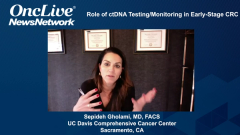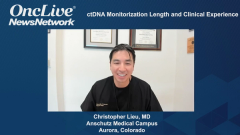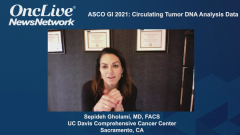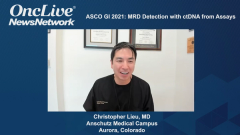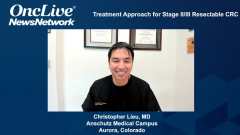
Treatment Approach for Stage II/III Resectable CRC
Key opinion leaders discuss their approach for the treatment of patients with stage II/III resectable colorectal cancer (CRC), with special consideration of factors for choosing perioperative therapy and the management of low- vs high-risk patients.
Christopher Lieu, MD: Hi, everybody. Thank you for taking the time to join our discussion about the role of circulating tumor DNA [ctDNA] and the management of stage II and III colorectal cancer [CRC]. My name is Chris Lieu. I’m a GI [gastrointestinal] medical oncologist at the University of Colorado Cancer Center. Joining me today is Dr Sepideh Gholami from UC [University of California] Davis Comprehensive Cancer Center. Dr Gholami is a surgical oncologist with a research focus in GI translational research, the tumor microenvironment, and immune profiling. Thank you for taking the time to join us today, Dr Gholami.
Sepideh Gholami, MD, FACS: Thank you for the invitation. It should be a good discussion, Chris.
Christopher Lieu, MD: This is certainly a hot topic for clinical care as well as research. It’s a good time to take a step back and look at the data and talk about how we’re going to incorporate this novel testing, in terms of how we treat patients with early stage colorectal cancer. Before we do that, Dr Gholami, I want to ask you, in regard to your treatment approach as a surgical oncologist—when you look at a patient with stage II or stage III colorectal cancer, what are some of the factors you consider when thinking about perioperative therapy or how we think about low- and high-risk patients. Obviously, this will differ between colon cancer and rectal cancer, but give us an overview of how you approach these patients.
Sepideh Gholami, MD, FACS: For this discussion I’m going to focus on colon cancer, Chris. The way I think about it is in terms of the adjuvant setting. There’s no perioperative chemotherapy for these early stage cancers. I look at the high- and low-risk features, and they’re different for stage II vs stage III.
For stage II, I look at if there was any clinical obstruction on the pathology, any evidence of LVI [lymphovascular invasion] or perineal invasion. The other 2 factors that are on the higher list for me is the T stage—T4 would be a high-risk patient and really inadequate for lymph node sampling; we require at least 12 lymph nodes to be resected in the surgical specimen. For those with high-risk disease, we would consider getting adjuvant chemotherapy for stage II.
For stage III, in general, we think of all cohorts, as long as they have a good performance status and can tolerate chemotherapy. Based on the IDEA trial, in which there is a 3-vs-6-month comparison, low-risk patients with T3N1 disease could now get 3 months vs 6 months. I consider the general ballpark—the adjuvant setting for these 2 patient populations.
Christopher Lieu, MD: Absolutely. When you think about patients who may benefit from neoadjuvant therapy vis-à-vis colon cancer, is there any discussion that you would consider in regard to preoperative chemotherapy for stage II or stage III patients?
Sepideh Gholami, MD, FACS: The data are not quite there. Maybe you think about it differently, but I don’t really consider that as a standard of care. I don’t know if you would in your practice as a medical oncologist. In general, as a surgeon, we rarely refer those to a medical oncologist.
Christopher Lieu, MD: Absolutely. I would just say there are some data from the FOxTROT trial looking at preoperative chemotherapy, but at the same time I’ve personally done it only a handful of times, when we’re really worried about tumor invasion into the psoas muscle or something like that. But it’s 1 of the few instances where I’ve actually given it.
Sepideh Gholami, MD, FACS: That makes sense if you think of those situations where, surgically, you would worry about not getting an adequate margin, or you’re worried about local invasion. It makes sense to downstage it, as you said, and individually select patients.
Transcript Edited for Clarity


